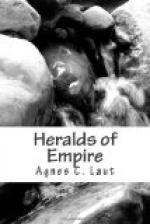And when we walked out to the thick edge of the shore-ice and launched the canoe among a whirling drift of ice-pans, we had small hope of ever seeing Fort Bourbon again. The ice had not the thickness of the spring jam, but it was sharp enough to cut our canoe, and we poled our way far oftener than we paddled. Where the currents of the two rivers joined, the wind had whipped the waters to a maelstrom. The night was moonless. It was well we did not see the white turmoil, else M. Radisson had had a mutiny on his hands. When the canoe leaped to the throb of the sucking currents like a cataract to the plunge, La Chesnaye clapped his pole athwart and called out a curse on such rashness. M. Radisson did not hear or did not heed. An ice-pan pitched against La Chesnaye’s place, and the merchant must needs thrust out to save himself.
The only light was the white glare of ice. The only guide across that heaving traverse, the unerring instinct of that tall figure at the bow, now plunging forward, now bracing back, now shouting out a “Steady!” that the wind carried to our ears, thrusting his pole to right, to left in lightning strokes, till the canoe suddenly darted up the roaring current of the north river.
Here we could no longer stem both wind and tide. M. Radisson ordered us ashore for rest. Fourteen days were we paddling, portaging, struggling up the north river before we came in range of the Hudson’s Bay fort built by Governor Brigdar.
Our proximity was heralded by a low laugh from M. de Radisson. “Look,” said he, “their ship aground in mud a mile from the fort. In case of attack, their forces will be divided. It is well,” said M. Radisson.
The Prince Rupert lay high on the shallows, fast bound in the freezing sands. Hiding our canoe in the woods, we came within hail and called. There was no answer.
“Drunk or scurvy,” commented M. Radisson. “An faith, Ramsay, ’twould be an easy capture if we had big enough fort to hold them all!”
Shaping his hands to a trumpet, he shouted, “How are you, there?”
As we were turning away a fellow came scrambling up the fo’castle and called back: “A little better, but all asleep.”
“A good time for us to examine the fort,” said M. de Radisson.
Aloud, he answered that he would not disturb the crew, and he wheeled us off through the woods.
“See!” he observed, as we emerged in full view of the stockaded fur post, “palisades nailed on from the inside—easily pushed loose from the outside. Pish!—low enough for a dog to jump.”
Posting us in ambush, he advanced to the main edifice behind the wide-open gate. I saw him shaking hands with the Governor of the Hudson’s Bay Company, who seemed on the point of sallying out to hunt.
Then he signalled for us to come. I had almost concluded he meant to capture Governor Brigdar on the spot; but Pierre Radisson ever took friends and foes unawares.




